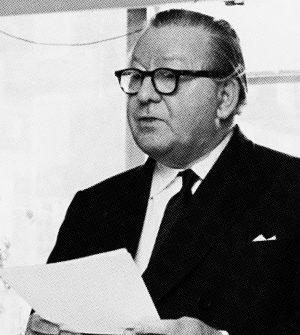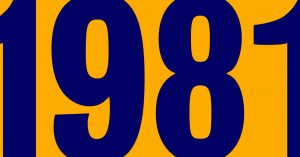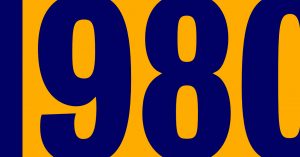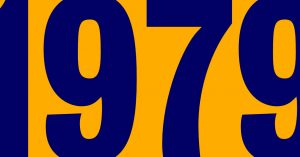ATV financial results: 1964
Sir Robert Renwick on Associated Television Limited’s 1964 results
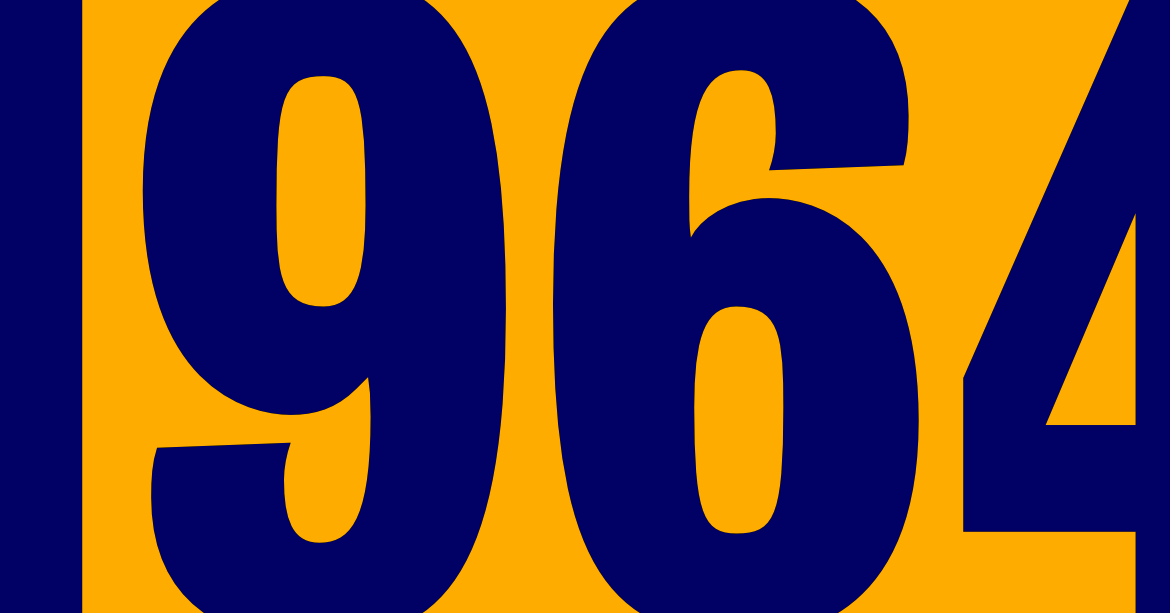
“An Excellent Year”
The Ninth Annual General Meeting of Associated Television Limited will be held on Thursday, 10th September, 1964, at 12 noon at ATV House, Great Cumberland Place, London, W.1.
The following are extracts from the circulated statement by the Chairman, Sir Robert Renwick, Bt., K.B.E. :-
On the 7th January, 1964, the Independent Television Authority informed your Company that the licence to broadcast in London on the week-ends and in the Midlands during the week-days was to be renewed after the expiry of the present licence on the 29th July of this year.
In the light of that event, it is all the more gratifying to be able to report an excellent year’s trading both in the home market and in the export field; and I may add that I have every confidence in your Company’s prospects for the ensuing year. The profit of the Group before taxation is £5,460,424 [£91.9m in today’s money allowing for inflation – Ed]. It will be noticed that the profit stands £2,054,710 [£34.6m] higher than for the 11 months of the Company’s 1962/63 financial period.
Your Board recommends the capitalisation of £4,650,000 [£78.3m] to be applied in paying up in full 18,600,000 “A” Ordinary Stock Units of 5s. each to be issued to Ordinary Shareholders and “A” Ordinary Stockholders on the basis of 4 “A” Ordinary Stock Units for every £1 Ordinary Share and 1 “A” Ordinary Stock Unit for every “A” Ordinary Stock Unit held by them respectively on 12th August, 1964. This will necessitate an increase in the authorised capital of the Company.
NEW LICENCE
The renewal of your Company’s licence is for three years from the 29th July, 1964, or until the opening of a second Independent Television Service, whichever shall be the sooner.
The licence provides that, if the date for the start of the second Independent Television Service should be after July 1967, the Authority may (subject to a review of rentals) extend the existing licence for a maximum period of a further three years. The immediate uncertainties which had been hanging over the whole television industry have thus been removed, and your own Company has been able to re-organise its operations in readiness to meet the changed conditions of the future.
The terms of the new licence which came into effect at the end of July of this year do not by any means follow the lines of the licence under which your Company has been operating since 1954. Quite the contrary, in fact.
First the levy on turnover, against which I had protested so strongly when the Government’s White Paper appeared in March 1963, begins to apply in August 1964. The amount of this levy on turnover – additional, it must be remembered, to normal income tax and profits tax – will, as far as can be judged, amount to something in the order of £4,500,000 [£75.8m] on a full year’s trading.
There is, admittedly, some respite inasmuch as, in the financial year 1964/65, only 8 months of turnover will be subjected to this reprehensible impost. This relief is, however, only temporary. And it is because the full effects will be felt in the financial year 1965/66 that your Board is taking active measures, which I believe will prove effective, to safeguard the overall financial position of your Company by building up additional revenues not subject to the Television Turnover Levy.
In this Report I am able to speak of the Company’s future with greater confidence than I have felt at any time during my Chairmanship. This is in no small measure because of the policy of growth through diversification consistently pursued by your Board. And I am happy to be able to say that there has been an overall improvement in your Company’s subsidiary activities.
Transdiffusion analysis
Barely a month after this statement was released, a general election was held. It had been expected that the Conservatives would win with a reduced majority, and with them would come the promised ITV-2 on UHF. In the event, Labour was elected with a tiny majority and ITV-2 was out of the question.
ATV had no way of knowing this, of course, so they had continued to plan technically and politically for the new service. They remained confident that they would get a seven-day contact in London, on UHF, and it appears they were prepared to give up the Midlands in return.
But they’d finally spotted a flaw in this plan. They’d spent the first two years of their life bleeding money heavily over start-up costs for ITV on VHF, with one of the main drains being how few people were prepared to have their single-channel TV sets converted to receive the new service. ITV-2 on UHF was an even tougher proposition. The sets would not just need converting, they’d need to be replaced entirely, and new, more complicated and expensive aerials purchased and fitted.
The British economy had been okay but stagnant for several years, thanks to a policy of “Stop-Go” – where massive amounts of money were allowed to flow in, then austerity imposed when inflation rose, then back to the free money when it subsided, then austerity again and so forth. This had knocked consumer confidence: are families prepared to pay for an expensive new luxury item when the HP or rental cost might suddenly soar or wages suddenly drop? No.
It would be back to square one for ATV, making programmes that nobody was seeing, leading advertisers to shy away, leading to losses. And with ITV-2, there wouldn’t be the warm hand of Associated-Rediffusion providing free office space and other silent subsidies to keep them going as the two would now be actual, rather than notional, competitors.
How to encourage people to get 625/UHF sets and aerials and keep up the existing flow of cash in the meantime? ATV solution is ingenious and unworkable to the point of being bonkers. Rediffusion and ATV would alternate, one week of ATV on UHF and Rediffusion on VHF, one week of ATV on VHF and Rediffusion on UHF. The programmes would remain the same thanks to networking between the two soon-to-be rival services.
Okay, yeah, fine, but why on earth would Rediffusion sell its programmes to ATV in order to keep ATV afloat until ATV was ready to go it alone in direct competition for advertiser money, viewers and talent in their own region? The ITA would have to force them to do it, which is exactly the thing Norman Collins of ATV had been loudly denouncing for the past couple of years. Leaving it to the market, as ATV and its ancestors had been arguing for since at least 1951, wouldn’t work: Rediffusion’s shareholders simply wouldn’t countenance it.
It’s also curious that ATV see ITV-2 as the way of ending the hated Levy on ITV companies’ turnover. An argument had been made in government that the Levy was necessary whilst ITV as a whole had a monopoly on television advertising. But once the money started pouring in to the Treasury, the politics changed. The Levy immediately ceased to be to do with the monopoly and became a cash cow for 11 Downing Street. It wouldn’t go away based on the optics and beliefs of two or three years previously. Government doesn’t work like that, and ATV should’ve known it.
MULTIPLE INTERESTS
Our production subsidiary, Incorporated Television Company Limited, has once again increased its volume of sales of film series and telerecordings in the Eastern Hemisphere.
In the Western Hemisphere our American subsidiary, Independent Television Corporation, has increased its sales to a figure in excess of $4,600,000 [$45.1m].
Late in 1962 we acquired the share capital of the A.P. Films group of companies, which includes a vigorous and expanding merchandising company. A.P. Films are the producers of the popular puppet film series “Supercar” and “Fireball XL5”. Their latest and most advanced production in colour, “Stingray”, is scheduled for showing in this country in the autumn and has already been offered a network showing in the U.S.A. I have never before predicted the success of any television series but, on this occasion, I do so without hesitation.
Our Australian group has continued to show satisfactory profits with improving results from television operations, and the decline in revenue from the radio operations resulting from the impact of television competition has been halted. For some time, however, your Board has been feeling that with the Company’s already large and steadily increasing activities in the film distribution field it would be better if it held no interests in individual stations and was therefore able to deal with all possible customers on terms of strict impartiality. Accordingly, since the year end we have sold our Australian interest to Fairfax Corporation Pty. Ltd. at a price of £2,060,000 [£34.7m] which compares with a book value of £543,815 [£9.2m]. We have excluded from the sale our Australian Television Programme Distribution Department which will be incorporated into a new company. The distribution operation, it should be noted, has been providing approximately 25 per cent of the profits derived from the Australian investment.
Commercial television in Canada has been gaining ground, and both stations in which we have an interest have now reached a profit-making stage though initial losses remain to be recouped.
Muzak, our background music service, continues its planned growth and your Board is confident that it will become profit-making in the not too distant future.
Ambassador Bowling Limited is already operating profitably and with the continuing increase of the popularity of this sport your Board is satisfied that this will prove a most rewarding investment.
Pye Records Ltd., of which your Company owns 50 per cent., has made most encouraging progress in the past year and there is every indication that the current financial year will show rapid and continuing expansion.
RANGE OF PROGRAMMES
The range of Independent Television programmes, already wide, grows steadily. Among the more serious contributions which have attracted large and attentive audiences are the weekly “Ombudsman” programmes, “Fair Play”; the highly topical and penetrating “Braden Beat”; the series of three programmes by Sir Kenneth Clark, “Discovering Japanese Art”; and the three programmes by Mr. Felix Greene on Red China which contained entirely new and hitherto unobtainable film material.
The programme year was memorable, moreover, for the second “Golden Hour” from Covent Garden in which Maria Callas and Tito Gobbi appeared in the whole of the second act of “Tosca”. This performance was seen by more than 9,000,000 viewers.
Adult Educational programmes in which, as the week-end Contractor in London, your Company has pioneered, continue to achieve successes which educationists in previous generations would have regarded as impossible. To cite an example, “Mesdames, Messieurs”, the adult French series, is regularly watched by some 300,000 viewers, and the companion volumes published on ATV’s behalf by Penguin Books have already sold over 60,000 copies.
ATV’s religious broadcasting amounted to 50 hours. It included the Coronation of Pope Paul in Rome; “Requiem for a Dead Statesman”, an anthology on the occasion of President Kennedy’s death; and the two programmes “Church and State” in which the Rt. Hon. R. A. Butler and the Rt. Hon. Harold Wilson appeared on successive Sundays.
During the year there has been a marked increase in the number of Outside Broadcasts reflecting the life of people whom we serve within the area of the Lichfield transmitter. The most notable of these was the two-hour broadcast of the celebrations at Stratford-on-Avon on the occasion of the 400th anniversary of Shakespeare’s birth.
“Midland Farming”, it is most pleasing to be able to report, has been cited by the National Farmers’ Union as “the most instructive farming programme on the air”; and the daily “Midlands News” – the first regional news programme in Independent Television – continues to command a major audience.
In the field of public service, it is good also to be able to add that “Police Five” has earned the special commendation of the Force in having helped in the apprehension of wanted criminals.
The number of homes in the London area capable of receiving Independent Television is now approximately 3,300,000. Your Company serves this public at week-ends. In the Midlands the number of homes is close on 2,000,000 and your Company serves this public on all five week-days.
SECOND INDEPENDENT TELEVISION SERVICE
In my Report last year I reminded you that on the 27th June, 1963, the Postmaster General had announced in the House of Commons that by 1966, when there should be not fewer than one and a half million sets in London capable of receiving a new 625-line service in UHF, he would authorise a second Independent channel in the main areas.
This announcement was greeted with especial acclamation by your Board because, throughout the whole history of Independent Television, we have consistently been advocating the introduction of genuine competition which would put an end to the present monopolistic system which exists in all areas.
With the foreseeable increases in advertising expenditures, or even with advertising expenditures remaining steady at their present level, there is an entirely sound financial foundation for two good and effective Independent channels in all the main areas.
Two facts, however, must be faced. First, it should be recognized that the levy on turnover was introduced by the Government in order to level off the high profits arising during the present monopoly phase and that this levy will have to be abolished entirely when companies are in direct competition one with another. Secondly, for some years to come there is bound to be a wide difference in the number of television sets capable of receiving the new 625-line UHF service and those capable of receiving only the original 405-line VHF service. This discrepancy is sometimes advanced as a reason why competition is impracticable and the question is asked “How can any company awarded the UHF licence possibly hope to survive?” The straight-forward solution which your Board would be most happy to accept is that of awarding licences for operation in alternate weeks on VHF and UHF respectively thus placing rival companies on an exact equality. It may be added that a simple matter of inter-company networking would ensure the continuity of programming which the public would have a right to expect.
Your own Board looks forward with eagerness to the day when we shall be empowered to operate a seven-day-a-week service, free of levy, and in full competition with a rival licensed company.
In the whole wide and, I trust, expanding field of British broadcasting the chief grounds for concern would appear to be the heavy costs involved in the operation of BBC 2 and the amount by which the BBC will be seeking to get the Government to agree to increase the licence fee, which already stands at £4 [£67]. A heavy licence fee is naturally a serious deterrent to the whole television industry, and must therefore be resisted.
About the author
As a public company with shareholders, ATV was required to publish a detailed Annual Report at the end of each financial year. It was common to also publish a Chairman's Statement, summing up the report in more readable language.


